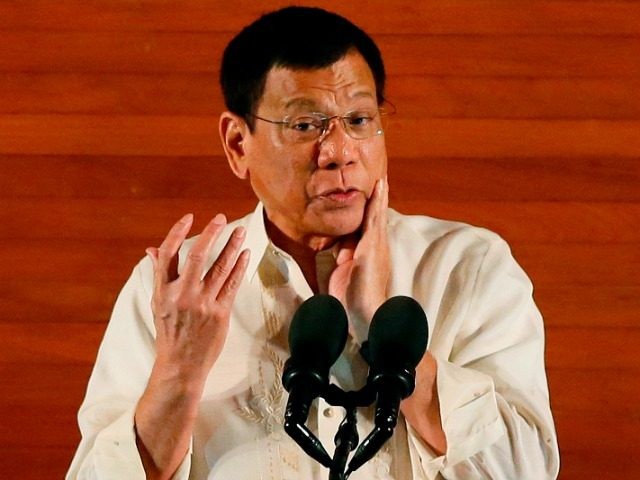Philippine President Rodrigo Duterte alleged that he had been molested as a teen by a Catholic priest and accused clergy of having bad breath while administering Confession in a blistering rant against the “full of sh*t” Catholic Church Tuesday.
Duterte delivered a speech on the clergy from Manila’s presidential palace, Malacanang, on Tuesday, brandishing a book on pedophilia and sex scandals in the Philippine Catholic Church titled Altar of Secrets. “I’ll make you a deal,” he said, addressing the nation’s clergy. “Read this book and if I feel that almost everyone has read it, then go back to me and tell me binastos ko ang relihiyon at nagsisinungaling ako (I disrespected religion and I lied) and I will resign, I will resign.”
“I challenge you now. I challenge the Catholic Church. You are full of sh*t,” Duterte told his audience, “You are all filthy.” The Philippine Star notes that the intention of the speech was to address the “families of the 44 police commandos who died in the 2015 Mamasapano clash.”
Duterte also advises Philippine Catholics to seek a personal relationship with God to emancipate themselves from the Church. “There is a God. You better cultivate your relationship between you and God,” he suggested, adding, “Do not go to confession. When you face those crazies, sometimes [they did not brush their teeth] What did you eat last night?”
Duterte took some time out of the address to address Bishop Teodoro Bacani Jr, a retired clergyman who resigned following accusations of sexual harassment. “F** that Bacani, he has 2 wives just like me, he’s just like a mayor, that fool. And this monkey talks as if… F***,” Duterte said, according to a translation by ABS-CBN.
“If he [said] that, I pity him. It sounded crazy. I pray for him,” Bacani reportedly said in a text to reporters following the event.
Duterte has been at war with the Catholic Church, despite being a Catholic himself in a predominantly Catholic nation, since he launched his presidential campaign. Duterte apologized to Pope Francis for calling him a “son of a whore” after being stuck in traffic during the pontiff’s visit to Manila. Even before then, Duterte had gone public with his own sexual assault, telling reporters in December 2015 that the priest who had molested him when he was “14 or 15” was named Father Paul Falvey, S.J., and that “it was a case of fondling—you know what—he did during confession, that’s how we lost our innocence early.”
Duterte has called the experience a “sort of sexual awakening” that he and multiple male peers in his high school had with the father.
A year later, he told the national outlet Rappler that he was afraid of the Catholic Church and did not denounce the priest at the time. “I will not file a case against the priest because I belong to the Catholic Church,” he said, adding that Falvey had reportedly later been taken to court over similar charges. “I was only 14 or 15, I am now 70 years old. How do you suppose I should file a case?” he said of any subsequent possibility of bringing him to justice.
Rappler confirmed with the Philippine Province of the Society of Jesus that Falvey died in the United States, where “he was posthumously accused of abuses committed [in the US].”
In addition to his own personal struggles with the Catholic Church, Duterte has taken to attacking clergy for their opposition to his policies against drug criminals. The Church has vocally opposed the use of extrajudicial killing to curb drug trafficking; Duterte has responded by suggesting that priests try methamphetamine to understand the horror of drug abuse before judging his presidency.
Following his speech Tuesday, Catholic leaders issued remarks asserting that they had so far been “very, very patient” with Duterte and that they will continue to try to engage him. “The Church is not the enemy of the President or of the government,” Fr. Jerome Secillano, executive secretary of the public affairs committee of the Catholic Bishops’ Conference of the Philippines (CBCP), said. “We do not condone criminality, but we continue to emphasize that [punishment] must be done in a legal manner.”

COMMENTS
Please let us know if you're having issues with commenting.